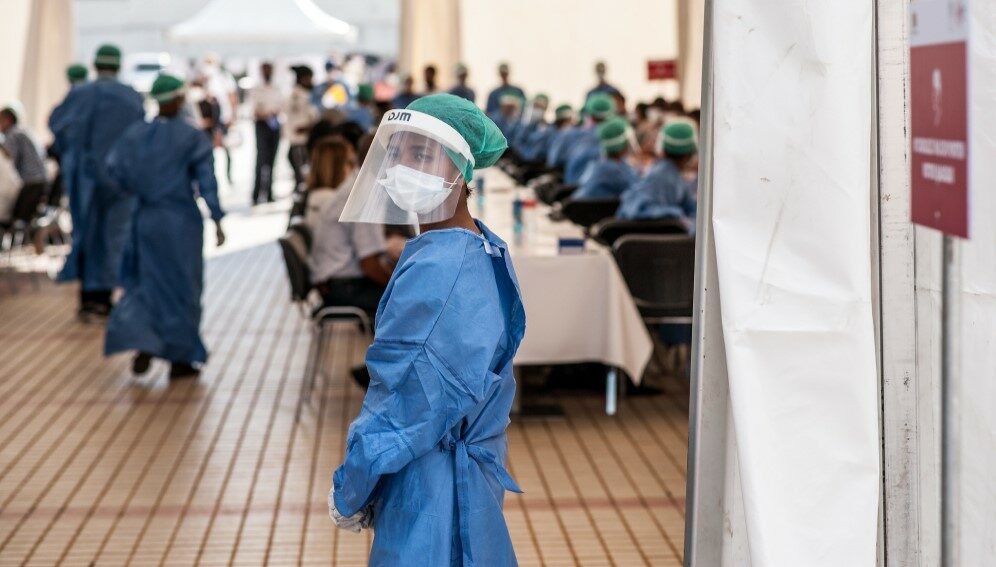22/11/21
Equipping Nigeria’s health workers to respond to emergencies

By: Jackie Opara
Send to a friend
The details you provide on this page will not be used to send unsolicited email, and will not be sold to a 3rd party. See privacy policy.
[LAGOS] The need to equip African healthcare workers with the knowledge and skills for responding to public health emergencies has been brought into stark relief by the continuing COVID-19 pandemic.
Mary Adetinuke Boyd, a paediatrician who specialises in tropical medicine and infectious diseases, is leading the Nigeria office of the US Centers for Disease Control and Prevention (CDC) to build capacity to tackle health threats and spoke to SciDev.Net about these challenges.
Boyd served as deputy associate director for programmes from 2016 to 2018 in the CDC Zambia country office and as senior medical advisor from 2018 to 2020. While in Zambia, she also led the antiretroviral treatment surge campaign and established the Zambia national HIV clinical mentorship programme.
The vaccinologist joined the US Food and Drug Administration from 2013 to 2016, where she led global health vaccine efforts for Ebola.
“I think the most important support we provide is the replication of US skill and capacity to serve the people of Nigeria across different areas.”
Adetinuke (Mary) Boyd, CDC Nigeria
She says that being the country director of CDC Nigeria is a tremendous responsibility and an incredible opportunity to save lives across multiple disease areas, supporting efforts to stem major diseases affecting the region.
According to Boyd, US CDC works with federal and state ministries of health and partners to address public health issues such as HIV, tuberculosis, and malaria, and immunisation for vaccine-preventable diseases. It also focuses on improving global health security, strengthening laboratory, surveillance and workforce capacity to respond to disease outbreaks.
“I think the most important support we provide is the replication of US skill and capacity to serve the people of Nigeria across different areas,” she says. “Whether it’s through the training of field epidemiologists to respond to disease outbreaks or to develop the skills of clinicians to manage HIV patients using the latest guidelines and to implement HIV programme innovations, this support translates into our primary mission, which is to support the national health response in the application of health promotion, disease prevention and control measures to improve the health of people in Nigeria through technical expertise, effective local partnerships and systems strengthening.”
These efforts have led to routine childhood vaccine coverage in Nigeria steadily increasing from 50 per cent to about 70 per cent in the last four years.
And in the fight against the HIV epidemic, the US government has enabled more than 1.6 million people living with HIV in Nigeria to access life-saving antiretroviral treatment, says Boyd.
“These ongoing efforts not only save individual lives and restore population health but healthier people can now drive a stronger economy”.
The US CDC was recently involved in a training programme on public health emergency management in Nigeria. The first cohort of 40 participants was drawn from the Nigeria Centre for Disease Control state-level ministries of health, the Nigeria Port Health Services, and the Nigerian military in the Public Health Emergency Management Professional Certification (PHEM PC).
“The PHEM PC course was an incredibly successful training that will continue to pay off years from now,” says Boyd. “The successful completion of the training is a significant achievement for Nigeria as it now has qualified and trained PHEM experts and the four international PHEM fellows who can train public health emergency responders and practitioners at the basic level and, most importantly, act as first responders against public health threats.”
Boyd tells SciDev.Net that the devastating impact of the COVID-19 pandemic illustrates now more than ever the importance of ensuring that public health and healthcare systems can adequately prevent, tackle and recover from health emergencies.
Nigeria’s enormous population size and magnitude is both its biggest challenge and its greatest opportunity, she adds. While the gaps tend to be large and complex, the most gratifying part of working through those challenges to find solutions is the enormous good that comes from such opportunities and the fact that many lives are saved, she tells SciDev.Net.Boyd says that she finds meaning in bringing health and well-being to individuals and vulnerable communities “because I believe it’s a basic right that everyone needs and should experience”.
This piece was produced by SciDev.Net’s Sub-Saharan Africa English desk.













